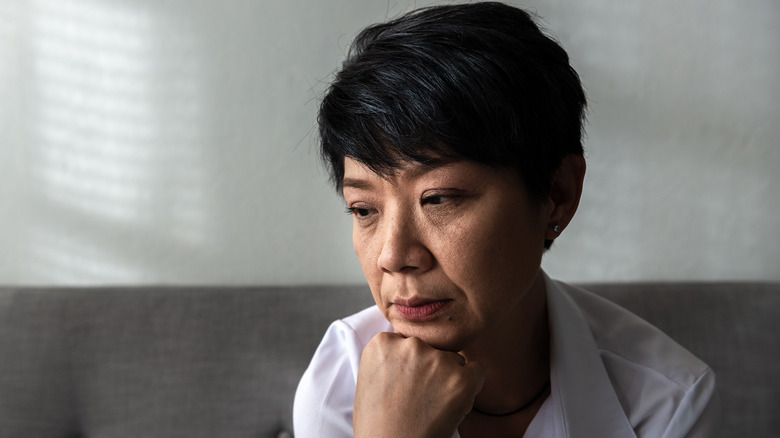Signs That You're Having A Midlife Crisis (And What To Do About It)
We've all seen the movies and TV shows where a man will go through a midlife crisis, only to buy a sports car or motorcycle, get a divorce, and date a younger woman. In reality, going through a midlife crisis can be much different, especially for a woman. Having a midlife crisis is more common than you may think. Many people go through some sort of midlife experience that can leave them feeling a bit lost when it comes to the future as well as the past.
Midlife typically describes people who are between the ages of ages 40 and 60. During this time in life, many people face uncertainty about what lies ahead for them and also begin to question the choices they've made. Things that can trigger a midlife event include changing hormones related to menopause, not being fulfilled at work or in your relationships, regret over not having children or getting married, watching your own parents age, the death of a loved one, or changes within your own family such as children leaving home. "A midlife crisis is often an indicator that purpose and meaning are missing in our life. Therefore, a thorough evaluation of one's actions, behaviors, and goals to ensure they are aligned with values is a crucial aspect of managing a midlife crisis," therapist James Killian tells Choosing Therapy.
So, how do you know if you're going through a midlife crisis? There are some big signs to look out for.
Mental health issues often accompany a midlife crisis
If you've been taking stock of your life and find that you're not as happy as you used to be, you could be experiencing a midlife crisis. This event is usually brought on by our own thoughts as we evaluate our lives and become much more aware of the aging process. "When people reevaluate their lives, it often brings up mixed emotions of anxiety, stress, regret, and sadness," psychotherapist Annette Nuñez tells MBG Mindfulness.
Some of the most common signs that you're going through a midlife crisis include mental health issues such as depression and anxiety. Although these things can be standalone problems for people of all ages, they can also develop when a person is going through a midlife crisis. Feeling a sense of sadness and emptiness about what you haven't done in life, as well as a belief that you won't accomplish more going forward, can often trigger these feelings. Feelings of loss, loneliness, and boredom are often red flags that something isn't right, as is an unhealthy fixation on the past and asking yourself deep, existential questions about the meaning of your life, relationships, and more.
If you or someone you know needs help with mental health, please contact the Crisis Text Line by texting HOME to 741741, call the National Alliance on Mental Illness helpline at 1-800-950-NAMI (6264), or visit the National Institute of Mental Health website.
A midlife crisis can cause physical symptoms
In addition to the mental health issues that may accompany a midlife crisis, women may find themselves struggling with a plethora of physical symptoms as well. Some physical signs of a midlife crisis include weight gain and weight loss. Although fluctuating weight can be a normal part of aging, it can also be a sign of an emotional crisis. In addition, pain such as headaches and stomach issues may become an issue if you're struggling with a midlife event, per Mayo Clinic. Migraines are often a problem that appears due to the stress and anxiety that can accompany an emotional breakdown (via LA Times).
Lack of sleep is another big issue that people can experience during a midlife crisis. In addition, other physical pain such as unexplained body aches can become a problem that also adds to the stress during an emotional crisis. Although there may be a valid reason for your pain, it may also be a psychosomatic symptom of your emotions and feelings at the time.
For women, a midlife crisis may also trigger changes in their menstrual cycles. Although perimenopause can start in your 30s, it's normal to start experiencing menopause symptoms during midlife. Sometimes these changes can be part of the reason for an emotional crisis or at times a symptom.
Some women self-sabotage during a midlife crisis
While in the midst of a midlife crisis, some women may find themselves struggling in many areas of their lives. Emotions can run high and impact family, partnerships, mental health, physical health, spirituality, career, and more. Sadly, at times some of these areas crumble due to neglect and self-sabotage. Self-sabotaging is a term used for when a person prevents themselves from accomplishing a goal or task and gets in the way of their own success.
During a midlife event, self-sabotage can look like giving up on your relationships or making rash decisions such as quitting your job, leaving your significant other, cutting people out of your life, or misusing drugs and alcohol. Others may withdraw from social activities, stop caring about their personal appearance, or turn down opportunities that would better their lives. "A midlife crisis might be seen in what they choose not to do such as turning down opportunities or setting new boundaries that suggest a shift to defining life for themselves rather than by others' standards," Dr. Heather Lyons tells Woman's Day.
A general lack of caring about things a person used to find fulfilling could lead to a mess that will be difficult to clean up once a midlife crisis is dealt with.
Finding a support system is key to breaking out of an emotional crisis
There is no timeline for getting past a midlife crisis, but if you can recognize the signs you'll be able to better understand what's happening and how to address it. One of the most important things that a person can do if they're going through a midlife event is to find a good support system. This could mean that you lean on your family members or significant other for support (via the Journal of Epidemiology and Community Health). However, others, like friends in your age range, may relate more to your situation. Online support groups also exist for people going through many emotional situations in their lives.
Of course, one of the most beneficial ways to get support during a midlife crisis can be therapy. Finding a therapist that you like and opening up about all of your emotions can be key to understanding what triggered your midlife crisis and figuring out how to move forward. "You need insight and awareness as to what is causing the discontent to know the life change you want to make," psychiatrist Anna Yusim tells MBG Mindfulness.
Getting the help of a trusted loved one or a medical professional can be invaluable when dealing with an emotional crisis, as well as reinforcing the thoughts that you are loved, respected, and valued in life.
Build a life you love
Another way to help move past a midlife crisis and get yourself back on track is by building a life you love. Figure out what you want out of your life right now and in the future, and make a plan to work toward those steps. This could be something as simple as finding and focusing on hobbies to reduce your anxiety, like reading, gardening, or crafting. It may also include bigger goals such as traveling to places you've always wanted to see, making new friends, focusing on your love life, or reconnecting with loved ones.
Something that can be very helpful while dealing with a midlife event can be finding a community of people you relate to. Join a club, take a class, or get your friends together for a monthly night out. Finding time to take care of yourself is also key. Try exercising to make your body and mind feel better. Start journaling as a way to get your emotions out, meditate as you look for answers and clarity, and spend time outdoors to connect to nature.
"Midlife crises are actually really helpful because in a sense, you start identifying who you are and what you want to do throughout the rest of your life. So midlife crises can be healthy as long as people don't react to them to the extremes," says Dr. Anna Yusim (via MBG Mindfulness). Of course, the most important thing will be understanding your feelings and creating a healthier environment moving forward.





